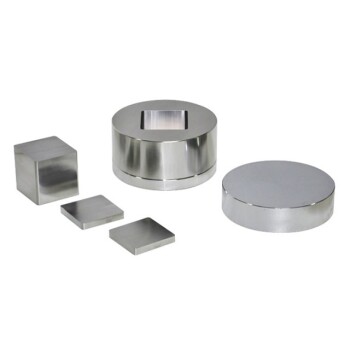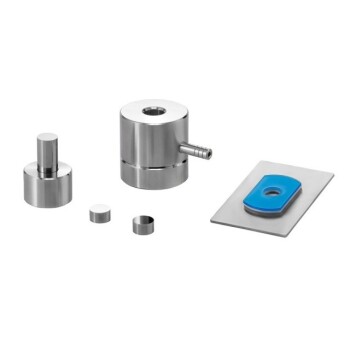At its core, hydraulic fluid is almost always oil-based in a hydraulic press because it excels at four distinct but equally critical jobs. It is virtually incompressible for efficient force transfer, provides essential lubrication for moving parts, remains stable under intense heat and pressure, and protects system components from corrosion.
The choice of oil is not arbitrary; it is a carefully engineered decision. The fluid is the lifeblood of the hydraulic system, and its specific properties are what enable the press to function reliably, efficiently, and with a long operational lifespan under extreme force.

The Core Principle: Incompressibility and Force Transmission
A hydraulic press operates on a simple principle: force applied to a fluid in a closed system is transmitted equally throughout that fluid. The choice of fluid is paramount to making this principle a reality.
Pascal's Law in Action
Hydraulic systems are a direct application of Pascal's Law. For this law to work effectively, the medium transmitting the force—the hydraulic fluid—must be incompressible.
Oil's molecular structure resists being squeezed into a smaller volume. This means that when pressure is applied to the fluid on one end, nearly 100% of that force is transmitted to the other end, moving the press ram with immense power.
Why Water Is Not the Standard
While water is also largely incompressible, it is rarely used in modern hydraulic presses. It lacks the lubricating properties of oil, leading to rapid wear, and it actively promotes rust and corrosion within the system's metal components.
Beyond Force: The Critical Role of Lubrication
Simply transmitting force is not enough. A hydraulic press is a machine with many moving parts operating under incredible stress.
Protecting High-Friction Components
Pistons, pumps, seals, and cylinders are in constant motion against each other. Without proper lubrication, the friction between these metal parts would cause catastrophic damage and rapid failure.
Hydraulic oil creates a thin, resilient film on all internal surfaces. This film prevents direct metal-on-metal contact, drastically reducing wear and heat generation.
Extending Component Lifespan
This constant lubrication is the single biggest factor in the longevity of a hydraulic press. It directly translates to less downtime, fewer costly repairs, and a more reliable machine.
Ensuring Stability Under Extreme Conditions
The environment inside an active hydraulic system is harsh. The fluid must be robust enough to survive intense and constant punishment.
Resisting Thermal Breakdown
The act of pressurizing a fluid generates significant heat. High-quality hydraulic oil is formulated with additives that help it resist thermal degradation, ensuring it maintains its ideal viscosity and lubricating properties even at high operating temperatures.
Preventing Sludge and Corrosion
Over time, exposure to oxygen and heat can cause oil to oxidize, creating sludge that can clog valves and filters. Premium hydraulic oils contain inhibitors that slow this process and prevent the formation of corrosive acids, keeping the system clean and functional.
Understanding the Pitfalls of Poor Fluid Management
Choosing the wrong fluid or neglecting its maintenance is one of the most common causes of hydraulic system failure.
The True Cost of Low-Quality Fluid
Using a cheaper, lower-quality oil is a false economy. Such fluids break down faster, offer inferior lubrication, and provide less protection against corrosion, leading directly to premature component failure and expensive repairs.
The Necessity of Regular Changes
Even the best hydraulic oil has a finite lifespan. Over time, it becomes contaminated with microscopic particles from wear and tear, and its protective additives are depleted.
Following the manufacturer's recommended schedule for oil changes and filter replacements is not just a suggestion; it is essential maintenance required to protect your investment.
Making the Right Choice for Your Goal
The fluid you use should be matched to the system's demands and operating environment.
- If your primary focus is maximum performance and longevity: Always use the specific high-quality oil grade recommended by the press manufacturer and adhere strictly to their maintenance schedule.
- If your primary focus is operating in extreme temperatures: Select a hydraulic oil with the appropriate viscosity index (VI) that ensures it flows correctly when cold and remains stable when hot.
- If your primary focus is system reliability: Treat fluid analysis and regular changes as your most important preventative maintenance tasks, as they prevent the vast majority of common hydraulic failures.
Ultimately, the hydraulic fluid is not merely a consumable; it is a core component of the machine's design and function.
Summary Table:
| Function | Benefit |
|---|---|
| Incompressibility | Efficient force transfer via Pascal's Law |
| Lubrication | Reduces wear on moving parts like pistons and seals |
| Thermal Stability | Maintains viscosity under high heat and pressure |
| Corrosion Protection | Prevents rust and extends system lifespan |
Upgrade your laboratory efficiency with KINTEK's reliable lab press machines! Whether you need an automatic lab press, isostatic press, or heated lab press, our equipment is engineered for precision and durability. Experience enhanced performance and reduced downtime with our tailored solutions. Contact us today to discuss how we can meet your specific lab needs and boost your productivity!
Visual Guide

Related Products
- Automatic Laboratory Hydraulic Press Lab Pellet Press Machine
- Automatic Laboratory Hydraulic Press for XRF and KBR Pellet Pressing
- Laboratory Hydraulic Press 2T Lab Pellet Press for KBR FTIR
- Laboratory Hydraulic Press Lab Pellet Press Machine for Glove Box
- Laboratory Hydraulic Press Lab Pellet Press Button Battery Press
People Also Ask
- What is the purpose of creating pellets for XRF spectroscopy using a hydraulic press? Ensure Accurate and Repeatable Elemental Analysis
- How are hydraulic pellet presses used in educational and industrial settings? Boost Efficiency in Labs and Workshops
- What are the key steps for making good KBr pellets? Master Precision for Flawless FTIR Analysis
- How are hydraulic presses used in the preparation of powder mixtures? Achieve Precise Compaction for Accurate Analysis
- How do hydraulic press machines ensure precision and consistency in pressure application? Achieve Reliable Force Control for Your Lab



















